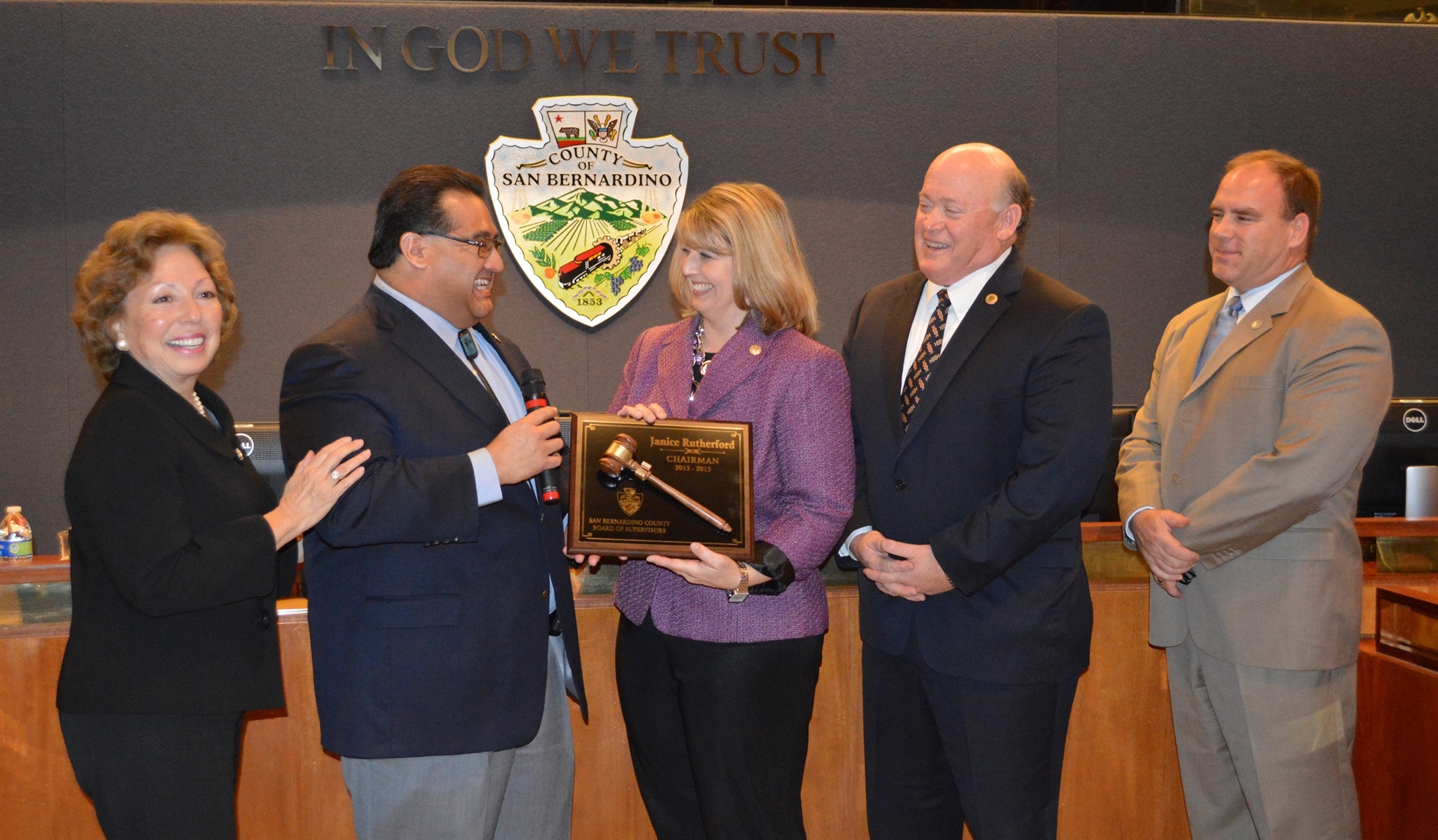"As
Chairman, I plan to continue our work in bringing job growth to our region, programs to assist the homeless youth in our county, the development of innovative
endeavors.” ……..comments Ramos.
San Bernardino County
Supervisors Choose Ramos

PHOTO: From
left to right: San Bernardino County Supervisors
Josie Gonzales,
James Ramos, Janice Rutherford, Robert Lovingood, and Curt
Hagman.
Tuesday
January 6, 2015, the San Bernardino County Board of
Supervisors, unanimously elected
Supervisor James Ramos to serve as Board Chairman and Supervisor Robert A.
Lovingood to serve as Vice Chairman for the next two years. "I am honored my colleagues have chosen
me to lead the Board over the next two years. It is truly humbling to serve as
the first Native American Supervisor and now Chairman of the Board of
Supervisors," Ramos said.
"As Chairman, I plan to continue our work in
bringing job growth to our region, programs to assist the homeless youth in our
county, the development of innovative endeavors at the County Museum, and many
other projects," Ramos commented.
"The Board remains committed to working together as a
team for the betterment of our San
Bernardino County family, including our many residents, employees, and
fellow elected officials. I look forward to working with our Vice Chairman
Robert Lovingood and my colleagues to continue to bring positive change to the
County of San Bernardino."
Chairman
Ramos and Vice Chairman Lovingood are
both midway through their first terms on the Board. Chairman Ramos represents
the Third District, which includes Redlands, Highland, Yucaipa, Loma Linda,
Grand Terrace, the Morongo Basin, the Big Bear Valley, Barstow, and portions of
San Bernardino. Vice Chairman Lovingood represents the First District, which
takes in most of the High Desert, including the cities of Apple Valley,
Hesperia, Victorville, Adelanto, and Needles.
"I thank Supervisor Curt Hagman for making the motion as well as my
colleagues on the Board of Supervisors for placing their trust in me. I look
forward to working closely with Board Chairman Ramos in advancing goals that
will make San Bernardino County an even better place to live, work and do
business," Vice Chairman Lovingood said.
The Board also thanked outgoing Chair Janice Rutherford for her two
years of service at the Board's helm. Supervisor Rutherford commended her
colleagues for working well as a team for the good of the county and tackling a
list of key issues, including property tax relief for seniors, court funding,
underwater mortgage relief, resolution of a divisive lawsuit against other
public agencies, discussions on charter reform, and improving the County’s
working relationship with neighboring Riverside County on issues of common
concern. The two boards of supervisors conducted a joint meeting on September
16, 2014.
The voter-approved
County Charter
requires the Board to elect a Chair at its first meeting in January following
an election of supervisors. The Chair serves as the Board’s general executive
agent by presiding over meetings of the Board, signing contracts approved by
the Board, and working with the Chief Executive Officer to set the Board’s
agenda.
Covering
more than 20,000 square miles and serving more than 2 million residents, the County of San Bernardino is the largest
county in the United States in terms of area and the fifth largest in
California in terms of population. The County’s 39 departments provide a wide
range of vital public services to residents, visitors, and businesses in the
areas of public safety, health care, land planning, recreation and culture,
elections, airports, economic development, and aid to children, the elderly,
veterans, and the poor.
County
Government worked closely with San
Bernardino Associated Governments, the county’s 24 cities and towns,
residents, and community leaders to create a Countywide Vision,
www.sbcounty.gov/vision. Elected leaders and other stakeholders are now focused
on achieving the Vision by setting and working toward regional goals.County Government is also focused on
stabilizing the County’s ongoing fiscal health by achieving sustainable budget
solutions, including making allowances for all potential liabilities and
working with employees to reach compensation agreements that are fair to workers
while ensuring long-term fiscal stability.